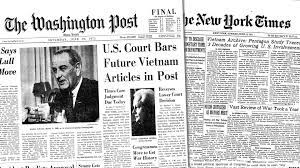Neglect of Anti-War Coverage
The First Amendment in the United States Constitution states that individuals or a community is able to articulate their opinions and ideas without fear of retaliation, censorship, or legal sanction. This principle, however, still has its limitations. You are not allowed to yell “Fire!” in a movie theater, you cannot threaten or harass people, and apparently, you also have limits on your opinions of war.
I believe the U.S. government limits the free speech and press of antiwar voices for a number of reasons. For starters, they want our country to appear as strong and united, making us a more fearful opponent. I would also argue that they are just trying to protect their agenda, for better or for worse. If the information in the Pentagon Papers was actively released for the public to see, there would have been tactile evidence to protest against our involvement. Perhaps the government has information they don't want to share so we will be oblivious to what we are supporting. The beauty of the United States is that the people have the power, and sometimes that is scary to politicians.
As with day-to-day politics, it is important to see and
understand both sides of an argument. Finding these unfamiliar publications
that voice their opposition is important in being able to make informed
decisions.




Comments
Post a Comment